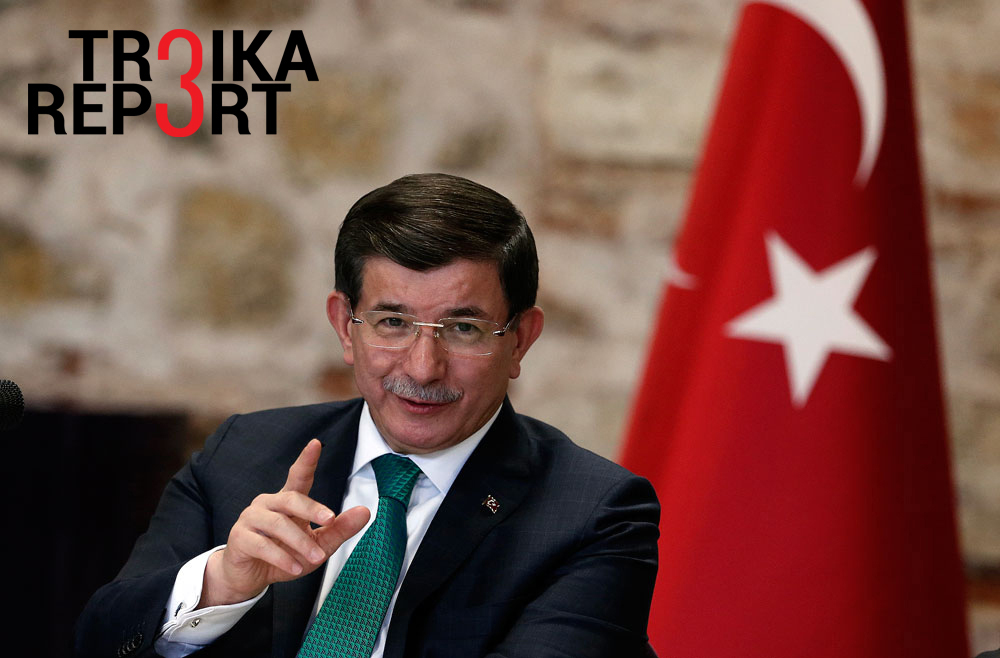
Turkish Prime Minister Ahmet Davutoğlu.
EPAThe Cold War-style war of words between Ankara and Moscow that characterized last fall and the early winter of 2015 has now been replaced by intriguing signals sent out by Turkish top officials.
In a matter of just a week, Prime Minister Ahmet Davutoğlu, followed by Minister of Transport, Maritime and Communication Binali Yildirim, suggested an eventual reconciliation, in what could either be a coincidence or a deliberate trial balloon to test Moscow’s reaction.
First, there were statistics: The number of Russian tourists visiting Turkey’s resort province of Antalya dropped by 81.14 percent compared to January 2015, with just 2,427 Russians holidaying in the resort area in January 2016.
Davutoğlu commented on the crunch by expressing a desire that the crisis in Ankara-Moscow relations would not decrease the flow of Russian tourists visiting Turkey.
A week later, a member of the cabinet, Binali Yildirim, positively appraised cooperation between Russia and Turkey in the years preceding the current crisis, lamented the present dire state of affairs, which, in his words, is detrimental to both countries, and accentuated what seems to be the official stance of the government: normalization of relations with Russia is desirable and welcome.
What is going on? Is this really a tacit signal to be taken into account by policy-makers in Moscow? Or is this unworthy of consideration? Talking to RBTH, Sergei Utkin, head of the department of strategic assessment and situation analysis at the Russian Academy of Sciences, opined that objective drivers are in play, and they are gradually pushing Turkey and Russia back into a common orbit.
“The economic and trade warfare is hurting both sides. Russia is the largest provider of energy for Turkey, while Turkish business, especially construction and developers companies, is visible on the Russian market. Don’t forget that the Turkish Riviera is the preferred holiday destination for millions of Russian vacationers. The tourist industry is a niche market; you cannot reformat it overnight. Both countries are on the receiving end of the current split. This is one of the factors pushing towards a settlement.”
True enough, the two countries have much to lose from the continuation of the sanctions and counter-sanctions.
Russian exports, according to 2014 statistics, constitute around 10 percent of Turkey's imports, while 4 percent of Turkey's export goods, mainly textiles and food, worth $6 billion, ended up in Russia.
Apart from economic and trade ties, are there any other weighty arguments in favor of Moscow and Ankara burying the hatchet?
“The second factor is the cold-shouldered treatment of Turkey by its NATO allies. The U.S.-led alliance sent a signal to Ankara: No military adventure in the region would get NATO support. The third factor in the equation is that the Turkish leadership is reluctant to trigger off a major confrontation that would pit it against Russia. The outcome of such hostilities cannot be conceived with any precision.
“All of these elements suggest that there is growing appreciation of the need to find ways to mend relations with Moscow.”
What is likely to be the most formidable obstacle on the path of normalization of bilateral relations? Sergei Utkin terms it “personalized politics,” implying the centralized mode of decision-making in Turkey and, for the moment, in Russia.
“Much has been said in the Western media of the two alleged similarity of the two leaders, [Recep Tayyip] Erdoğan and [Vladimir] Putin. Skipping over-exaggeration, much depends on to what extent the national leaders are psychologically ready to engage with each other. No doubt, it may happen after Ankara presents formal apologies, as demanded by Moscow. However, the format of the apologies could be variable. After all, Moscow has not shut the door altogether, [and is] most probably waiting for Ankara to make the first step toward reconciliation.”
It is worth mentioning that even at the height of tensions, when both sides exchanged harsh words and warnings, the Russian gas monopoly Gazprom maintained its commitment to pursuing the Turkish Stream pipeline project, which would inevitably turn Turkey into a major regional energy hub.
The offer to have Turkey on board the ambitious project is still valid: Moscow has not backtracked on this large-scale, multinational, long-term endeavor.
As history teaches, war is a temporary discord invariably followed by peace. But the road to peace is always bumpy.
In theory, Erdoğan and Putin could find a face-saving formula of putting behind them the animosity that broke out after the downing of the Russian Su-24 jet, when the sides’ divergence of interests on Syrian terrain, effectively contained by both parties out of pragmatic self-interest, blew up into a diplomatic and economic confrontation. The incident cannot be forgotten but the sides could get over it.
Basically, this would require a succession of conciliatory moves and sufficiently friendly rhetoric to soften the angst and close this unfortunate chapter, so reminiscent of the 10 wars that Turkey and Russia fought over several centuries.
The opinion of the writer may not necessarily reflect the position of RBTH or its staff.
All rights reserved by Rossiyskaya Gazeta.
Subscribe
to our newsletter!
Get the week's best stories straight to your inbox